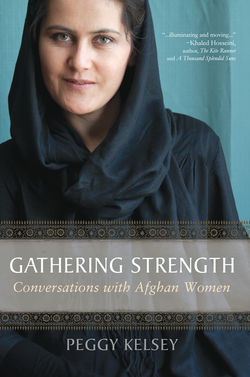Читать книгу Gathering Strength: - Peggy Kelsey - Страница 35
На сайте Литреса книга снята с продажи.
ОглавлениеShinkai Karokhail
Founding member/director Afghan Women’s Education Center
Member of Parliament
[Our demonstration against the Shia Personal Status Law] showed solidarity among women. Women have the same problems, they have the same pain and suffering, so it doesn’t matter whether they are Sunni, Shia, or Hindu.
When I first met her in 2003, Shinkai was already a striking presence, a strong, grounded, motherly figure with a commanding aura. These qualities had solidified when I met her again in 2010. Unlike most Afghan women I met, Shinkai didn’t mind being photographed without a careful application of makeup.
Shinkai graduated from medical school at Kabul University but had to leave almost immediately due to the mounting violence of the Soviet war. Unable to get hired by a hospital in Pakistan since jobs were reserved for Pakistanis, she and some friends founded the Afghan Women’s Education Center (AWEC), offering language and computer courses to women and motherly support to orphans and street kids. In 2011, AWEC finished building a school for some of Kabul’s 60,000 street children.
Peggy: Shinkai, what have been the biggest issues you’ve dealt with in Parliament?
Shinkai Karokhail: We worked against certain articles in the Shia Personal Status Law inside the Parliament for 15 months before we had a demonstration in April, 2009.
Peggy: My Hazara friend, Shakila, commented that you were very active in fighting the Shia Law even though you are a Pashtun and a Sunni.
Shinkai: Yes, because this is a human rights issue. I also saw that this Shia law would become the foundation of family law for Sunnis as well, because so far we don’t have a separate family law. We use part of the civil law most of the time.4 If this were to get approved, in the worst case scenario, we could never get anything for women. That’s why we had to stop it and not let it become law.
At first, I was alone and not even the Shia in Parliament would support me. Shia extremists actually warned the moderates not to touch this law. They tried to blackmail the moderates by saying, "This is the first time we are getting our own law, so we should all approve it." Eventually I got the moderates’ support. I told them, "I don’t think religious issues should be used against the rights of women."
Peggy: Any law that applies specifically to one religious group would be anathema and illegal in the US. However, it makes sense in the case of family law (not criminal or civil law) in the cultures of South Asia and the Middle East. In Jordan, for example, there are separate family laws for Christians and Muslims. This is welcomed; neither group wants to be bound by the requirements of the other. In Afghanistan, there are differences between Shia and Sunni traditions surrounding marriage, divorce, and child custody. For that reason, Shia women I talked with were happy to have their own law instead of being bound by Sunni-dominated traditional and Sharia law; they just didn’t like some of the articles this specific legislation contained.
Shinkai: The Shia Law was passed by the Parliament and then approved by President Karzai in February 2009. It only affected Shia Muslims, about six million people. In some ways, it was supposed to be an improvement for Shia
